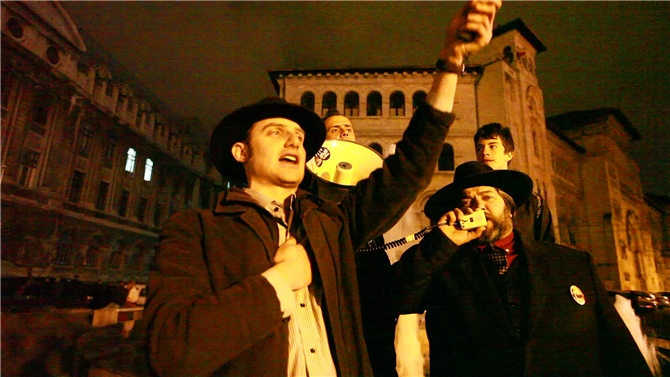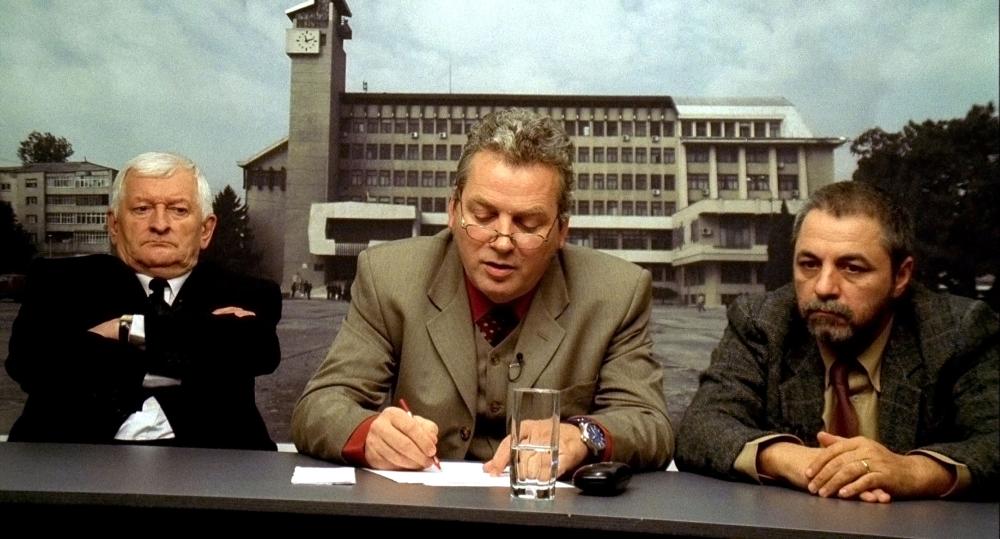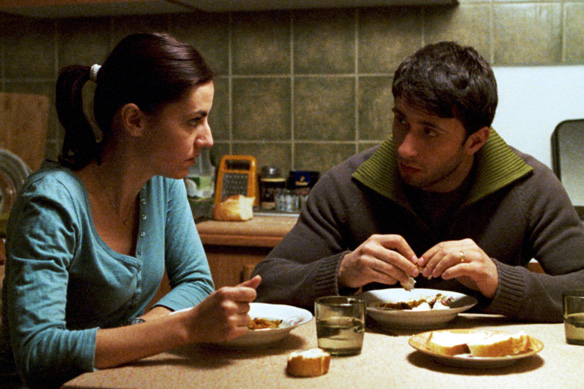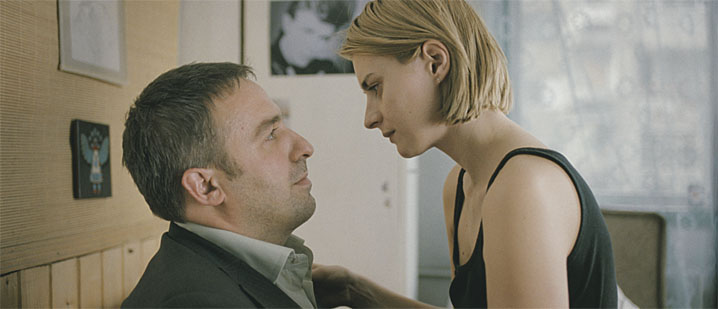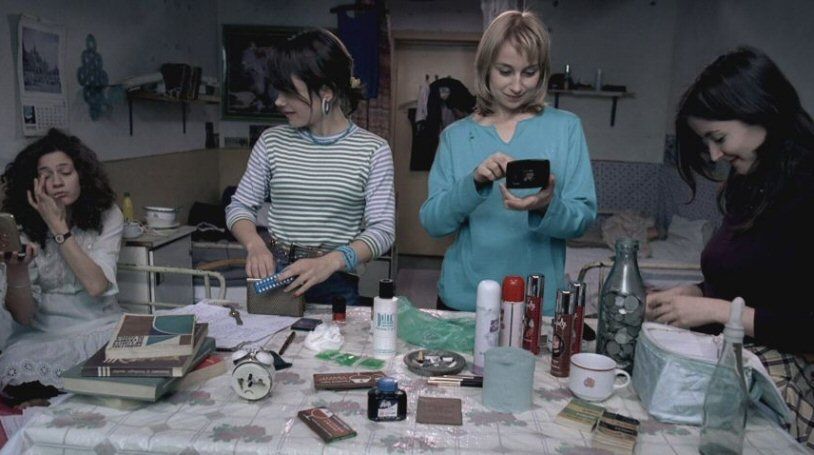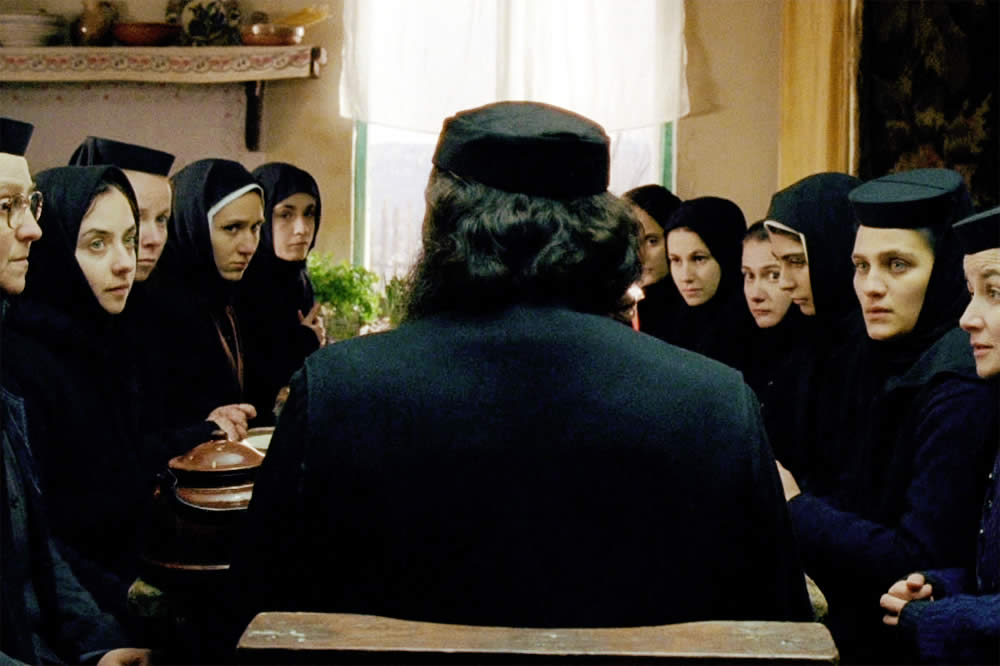8. Hooked (2008)
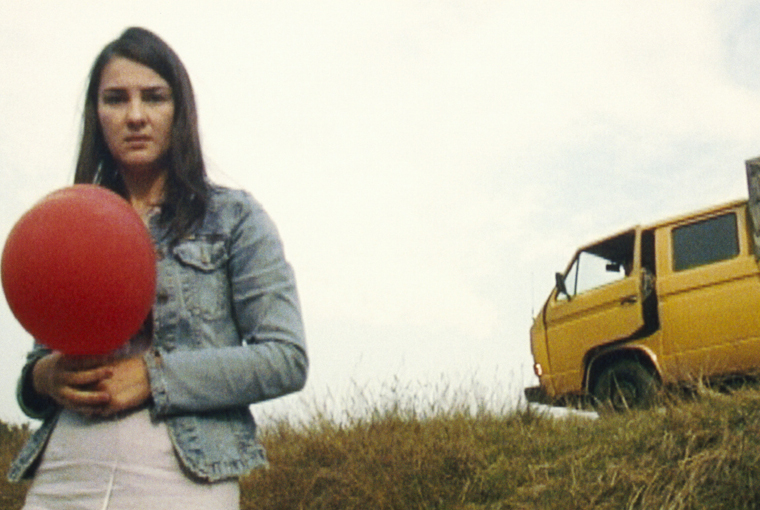
After a spate of short films, Adrian Sitaru’s first feature is a micro-budget production which follows a young couple on the verge of breakdown as they head out of the city for a day of sport fishing. What could possibly go wrong? Entirely shot in POV style, alternating from one character’s perspective to another, menace might just be lurking out of view.
Mihai (Adrian Titieni) and his lover, Sweetie (Ioana Flora) are already quarrelling in the car. Distracted, Sweetie runs over a prostitute just on a country side road and they both believe they have killed her. A moral dilemma ensues, Sweetie wants to act as if nothing has happened, she is married and this might blow her cover, morally bound Mihai is having none of it. But the drama shifts gear when the deceptively innocent Ana (Maria Dinulescu) wakes up and this third figure makes her presence felt. She asks whether she can join them on their picnic and they can’t but oblige.
As Ana bonds with the couple, the tensions unravel and the atmosphere becomes more unsettling. Ana’s motivations are never made clear and the couple suspend any decision on their future. There is something of Pinter’s comedy of menace, but the comedy takes some effort to tease out. Running at 80 minutes one can just bare the couple’s emotional unease.
7. Where Are You Bucharest? (2014)
Vlad Petri’s documentary bursts with youthful energy and anger at every turn of the camera, and they are many. It is a fully immersed record of roughly one year of protests, split in two phases, taking place in Bucharest’s University Square between January 2012-2013. Since the 1989 revolution this is the biggest expression of civil discontent in Romania. A protest is born, receives a second lease of life, and eventually dies down; the end has been rather sobering.
Petri doesn’t seem too interested in offering much historical context and background commentary. It may sound self-defeating but perhaps minute details are not so important. This slight detachment brings to the fore Petri’s real interest. For all the different motives possible and amongst all the confusion, passionate conversations are taking place on the streets. At times Petri participates in one-to-one conversations, at others the camera listens in on heated group debates and violent scuffles. In the background snow is falling, horns are honking and the gendarmes are being the gendarmes.
This is capitalist liberal democracy and its discontents. The young are idealistic, some of the old want the share of the money they were promised by one of the major parties to come out to protest. At times what we hear is bizarrely farcical and the cynical may be tempted to shun it all.
Together with its stylistic opposite Maidan (2014) by Ukrainian Sergei Loznitsa, and Jehane Noujaim’s The Square (2013), Petri’s film participates in carving out a new sub-genre of protest documentaries. Given the political state of present day Europe, what Bucharest has to say may be the most accessible and relevant to a wider European audience.
6. 12:08 East of Bucharest (2006)
“Is it a revolution if people take to the streets – after the fact?” This is one of the questions asked by Mr. Jderescu (Teodor Corban), a textile engineer come small-time TV talk-show host, to a panel made up by an alcoholic school teacher, Mr. Manescu (Ion Sapdaru), and Mr. Piscoci (Mircea Andreescu), a pensioner who entertains children by dressing as Father Christmas every December. In coming to terms with a more basic question, giving the film its Romanian title – was there or wasn’t there, a revolution, in the small of town of Vaslui? – lies the central premise of Corneliu Porumboiu’s slyly funny first feature.
For the first third of the film we get acquainted with the characters as they go around their daily tasks. Christmas is approaching, but more importantly, it is the 16th anniversary of the 1989 revolution. For the remaining part we watch them through a wobbling camera that goes in and out of focus as if we were sitting at home in front of our TV sets. The host of the show tries to restore some degree of professionalism by vaguely alluding to Plato and Heraclitus, but the script is unforgiving. Porumboiu capitalises on the ensemble’s shortcomings with a mastery of deadpan comedy.
It is a modest film, parodic and self-mocking, and its many rewards are in the details. Much of the laughter is due to the cast’s excellent performances, with slight changes in facial expressions repeatedly catching the characters off guard. Still, we might as well consider the questions seriously. Rarely has the scrutiny of the intricacies of history on film been so appealing. Porumboiu took home the award for best first film at Cannes (it did happen), it was probably well deserved.
5. Police, Adjective (2009)
So the title of Porumboiu’s second feature does not translate well in English, ‘police’ is a noun, and it takes a good deal of patience to come to terms with what it may be referring to. Stylistically it is a realist slice-of-life police drama, but it is not so much a traditional cinematic experience as much as a philosophical and intellectual one. For those so inclined, it is not without a quasi-epiphanic reward.
The setting is a grey drab industrial town and a young policeman, Cristi (Dragos Bucur), is assigned the task of following a 16-year-old boy suspected of smoking weed. Cristi learns he is indeed doing so but knowing that the kid can face 15 years for sharing it with his girlfriend and a school mate, he doesn’t want to prosecute.
In a lengthy and memorable scene at the police station, Cristi lays out his conscience to his captain but he will have none of it – eventually they pull out the dictionary. To a Romanian audience, this moral dilemma may be inextricable from the historical condition of having lived under a police state. To outsiders, it is not impossible to relate to.
The dialogues are not without Porumboiu’s brand of dry humour. The camerawork is rigorous and observational. Its few resources are stretched to an impressive end. Police, Adjective is a highly cerebral procedural drama, it moves slowly and there are little guns to speak of – the objects of power and comic fascination are the subtleties of definition.
4. Tuesday, After Christmas (2010)
Radu Muntean’s fourth feature, like his previous Boogie(Summer Holiday) (2008), is a domestic drama that steadies his position as one of cinema’s talented observers of marital affairs and adultery. The psychology of domesticity and the vague attraction of that escape away from home are under the microscope and on the dissecting table.
At the centre of it is Paul (Mimi Branescu), a 30-something banker married to Adriana (Mirela Opisor). Together they have a young daughter Mara. The love triangle is completed by the daughter’s dentist, Raluca (Maria Popistasu), with whom Paul is having an affair. The characters work at sustaining some illusions on each other and the long coming fallout takes its time. All the while, the film retains a high degree of dramatic tension.
Muntean’s film is a technically and formally accomplished piece of work which simultaneously packs in high affective value. Deliberately understated, the characters’ interactions never stray from the mundane. The camera sits steadily, the takes are long, and the gaze voyeuristic. There are no easy answers to this emotional entanglement and the film needs no villains to reap its rewards. Muntean delivers a slow-burner that capitalises on the cumulative power of the intimacy and empathy we’ve come to share with his characters.
3. 4 Months, 3 Weeks and 2 Days (2007)
In case some were still in doubt back it 2007, Cristian Mungiu’s Palme d’Or for 4 Months, 3 Weeks and 2 Days was the definite sign that the Wave had arrived and that it was soaring high. The film went on to receive wide distribution in over 60 countries and made numerous international critics’ top ten lists for both the years 2007 and 2008. It has been read as a critique of the Ceausescu regime and as taking some stance or other in relation to abortion. There is something of all of that, but it says nothing of the film’s formal triumph.
Set in the final years of Romania’s Communist era, Găbița (Laura Vasiliu), a university student in her early twenties is caught pregnant and seeks an illegal abortion. The film follows Găbița and her close friend Otilia Mihartescu (Anamaria Marinca) for no more than a day as they arrange for the procedure to take place in a hotel room and get through what will prove to be an unspeakable ordeal. The leads’ performances are nothing short of excellent, so is the one given by Vlad Ivanov who plays the chilling abortionist, Mr. Bebe.
Mungiu uses one long take per scene, the position and the panning movements of the hand held camera are crucial to the film’s heightened sense of naturalism. The dialogues are tense but the drama is in the silences.
Not least for its many accolades, in the minds of many 4 Months, is the Romanian film. It accentuates many elements associated with the New Wave. No music is used, it is hard around the edges and as true as it can be to the complex ranges of human relations and reactions.
2. Child’s Pose (2013)
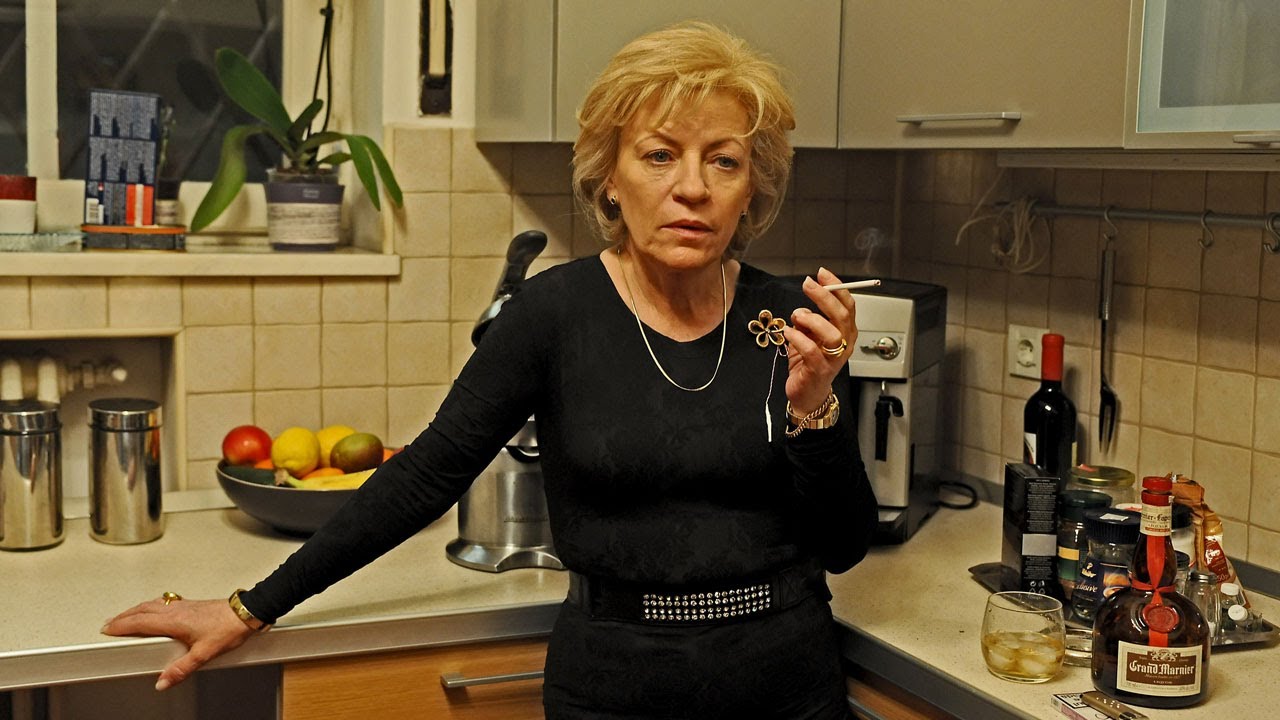
Calin Peter Netzer’s Child’s Pose went back home with a Golden Bear from Berlin. It is the first film fully deserving the label of a thriller to come out of the New Wave. The pacing is truly gripping but it is a far more intimate and intelligent piece of work than what we often expect from the genre. For a good deal of Romanian films on this list, bureaucratic corruption is often in the backdrop, casting its long shadow. Unlike none of them, here we are at the heart of it, and it’s a nightmarish upper-middle class family affair.
Luminita Gheorgiu gives an outstanding performance as Cornelia, a well-to-do architect and domineering mother desperate for proper acknowledgement from her 30-something-year-old son Barbu (Bogdan Dumitrache). Her influence, it seems, has been waning for a while. Her son is set on estrangement and the blame falls on his girlfriend.
When Barbu is arrested for drunk driving and faces manslaughter charges for running over a poor family’s child, Cornelia sees an opening to draw her son back. From this point onwards, emotional deficiencies, social manipulation, and corruptive payoffs become darker and ever more so deeply intertwined.
The hand-held camera work is jittery, the close-ups revealing, and it all feels very naturalistic – the craft, of course, is all around. The screenplay is written by Răzvan Rădulescu and the extent to which it suspends judgement is debatable. But the incisive insights it offers into family, class, and the origins of corruption are many and for all their complexity they feel effortless.
1. Beyond the Hills (2012)
Cristian Mungiu’s return after winning the Palme d’Or for 4 Months… is an equally brilliant mesmeric drama set in an Orthodox monastery standing on the hills of northern Romania. The real-life premise from which it was inspired sounds like tabloid fodder and it is easy to imagine another director turning this into something utterly exploitative. At the order of a convent’s priest, a young novice nun was bound to a cross in the hope of exorcising demons. After three days she was found suffocated. The whole affair was documented in two non-fiction books authored by Tatiana Niculescu Bran.
In the hands of Mungiu, the fictionalised account turns into a slow, rigorously executed drama, made up of long takes and two and a half hours worth of judgement’s deferral. If the film has anything to say about the case, it is that once more, the road to hell is paved with good intentions.
The film follows its two female leads and friends since childhood Alina (Cristina Flutur) and Voichita (Cosmina Stratan). Voichita has become a nun whilst Alina has just returned from Germany and joins Voichita at the monastery whilst planning to take her back with her. The two have grown up together in an orphanage but the rest of their relationship soon becomes obfuscated in sexual ambiguity. The monastery turns eerie and suffocating but the outside world may be even less inviting.
Remarkable performances throughout, gripping, and as multilayered a story as they come. The film took home an award for best screenplay and a shared award between the two actresses for best female performance in Cannes.
Author Bio: Andrew Ricca has recently completed a postgraduate program in literary studies in Leiden, the Netherlands. Tries his hand at writing on movies, places travelled to, and other writings.
